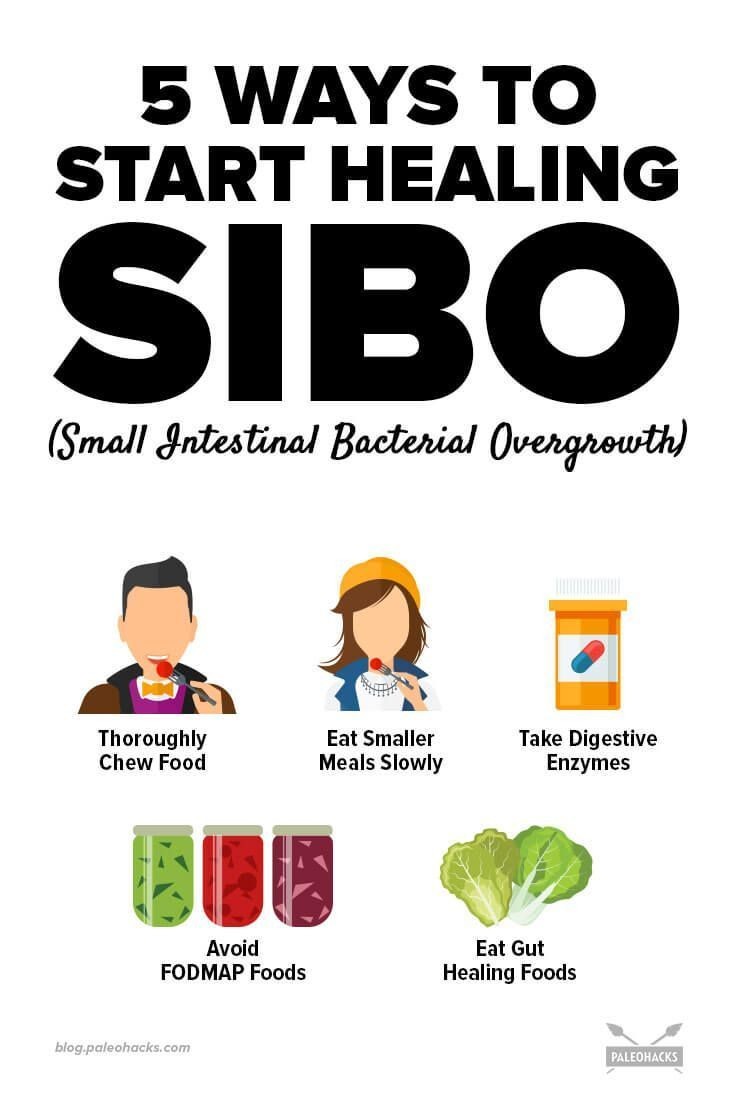
SIBO (Small Intestinal Bacterial Overgrowth)
SIBO stands for small intestinal bacterial overgrowth, and it can be considered in two types: one associated with identifiable diseases or conditions of the intestines, and the other not. Both types of SIBO can cause similar symptoms, such as indigestion, bloating, abdominal pain, and diarrhea or loose stools.
When SIBO is associated with intestinal diseases and conditions, it can lead to the inability of the body to absorb nutrients from the intestine, which may result in malnutrition and vitamin deficiencies. This article focuses solely on SIBO associated with intestinal diseases and conditions.
How does normal gut bacteria cause SIBO?
The small intestine is a relatively clean place. It receives food from the stomach, mixes it with acid and digestive juices, and turns it into a clean slurry that is then absorbed into the body. The refuse is passed into the large intestine, where water is absorbed and the feces become solid before being eliminated.
The normal gut bacteria perform crucial functions, such as aiding in the digestion of certain vitamins and protecting the intestine from disease-causing bacteria. However, when the normal function of the intestine is compromised, bacterial overgrowth can occur. This can be due to a lack of stomach acid, intestinal damage from toxins like alcohol, or a decrease in the speed of material transfer from the small intestine to the colon.
The colon is not as clean as the small intestine, and stool reflux or backflow into the small intestine can introduce colonic bacteria.
This article focuses solely on the type of SIBO associated with intestinal diseases and conditions.
Diseases and Conditions Associated with SIBO
Small intestine bacterial overgrowth is often associated with other illnesses that affect the function of the small intestine. The body has protective mechanisms to control bacteria, including stomach acidity and intestinal motility. Bacterial growth is hindered by bile and immunoglobulins, and the ileocecal valve prevents stool reflux into the small intestine.
Any illness or disease that affects the body’s defense mechanism puts a person at risk for SIBO, but most cases are due to intestinal motility problems caused by:
- Complications from gastric bypass surgery
- Bowel strictures and adhesions that can lead to intermittent bowel obstructions
- Diverticuli or outpouchings of the small intestine
- Tumors
Neurologic diseases such as myotonic dystrophy, Parkinson’s disease, and intestinal pseudo-obstruction may also affect bowel motility and contribute to SIBO. People with diabetes and autonomic dysfunction are also at risk.
Other intestinal diseases associated with SIBO include Crohn’s disease, celiac disease, achlorhydria, cirrhosis of the liver, alcohol abuse, non-alcoholic steatohepatitis (NASH), and scleroderma, leukemia, and lymphoma.
Signs and Symptoms of SIBO
There are no specific complaints or physical findings that definitively diagnose SIBO. Instead, the presence of multiple non-specific symptoms should raise suspicion of SIBO.
The initial symptoms may include abdominal pain, bloating, indigestion, diarrhea, and excess gas. However, not all symptoms may be present in every person with SIBO.
As the disease progresses, bacterial overgrowth can impair nutrient absorption, leading to vitamin and electrolyte abnormalities, protein deficiencies, and difficulties with fat absorption.
Other potential symptoms of SIBO include pernicious anemia, iron deficiency anemia, decreased vitamin A, metabolic bone disease, malnutrition, weight loss, muscle wasting, steatorrhea (excess fat in the feces), and anal leakage or fecal incontinence.
Diagnostics for SIBO and Associated Conditions
Diagnosing SIBO can be challenging due to its non-specific symptoms. The diagnosis may be suggested by illnesses associated with malabsorption. Blood tests can help identify causes of anemia, electrolyte imbalances, and vitamin deficiencies.
Breath tests can detect byproducts of bacterial digestion, aiding in the diagnosis of SIBO. Upper GI endoscopy allows for examination of the small intestine and biopsy collection to assess for intestinal damage.
While conducting diagnostic tests, it is important to investigate associated conditions. If an associated condition is known, maximizing its treatment should coincide with the diagnosis and testing for SIBO.
Treatment of SIBO with Antibiotics and Probiotics
The treatment for SIBO involves controlling and treating any underlying associated illness, as curing the disease entirely may not be possible.
Antibiotics can help control bacterial overgrowth, but it’s not necessary to eradicate all gut bacteria since some aid in digestion. Commonly prescribed antibiotics for SIBO include amoxicillin-clavulanate (Augmentin) and rifaximin (Xifaxan), along with other antibiotics depending on the situation.
Recurrent SIBO may require repeated courses of antibiotics, with some individuals alternating between periods on and off the antibiotic.
In addition, addressing underlying vitamin and nutrient deficiencies due to malabsorption is crucial.
Prognosis and Prevention of SIBO
SIBO is usually associated with an underlying illness, and even with treatment, the relapse rate is high. Proper management and control of the underlying illness are crucial for managing SIBO effectively.
Prevention of SIBO involves properly treating and managing chronic diseases that may affect the intestine.
Citations: Tursi A, Brandimarte G, Giorgetti GM, Elisei W. Assessment of small intestinal bacterial overgrowth in uncomplicated acute diverticulitis of the colon. World J Gastroenterol. 2005;11:2773–2776.


